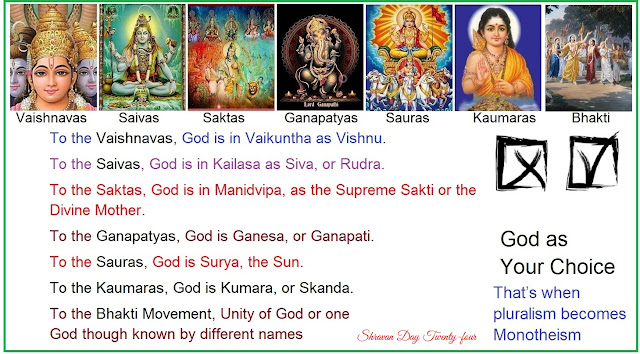Shiva Day Twenty-four
The Concept of God in Hinduism by Swami
Krishnanada
1. According to the Pancharatra Agama and the Vaishnava theology, God has five forms:
the Para or the Transcendent, Antaryamin or the Immanent, Vyuha or the
Collective(known as Vasudeva, Sankarshana, Pradyumna, and Aniruddha), Vibhava or
the Incarnation, and Archa or the symbolic form of daily worship.
2. According to Saiva tradition, God is Pati, the Lord who controls the individuals
known as Pasu, with His Power known as Pasa.
3. According to the Sakta tradition, God is the Divine Universal Mother of all things,
Adi-Sakti, or the original Creative Power, manifesting Herself as Kriya-Sakti
or Durga, Ichha-Sakti or Lakshmi, and Jnana-Sakti or Sarasvati. But the Supreme
Mother is beyond all these forms. She is One, alone, without a second.
4. According to the Bhakti tradition, God is the Supreme Object of Love, in respect of
Whom love is evinced as in respect of one's father, mother, friend, son,
master, or one's own beloved, in the five forms of affection, known as Shanta,
Sakhya, Vatsalya, Dasya, and Madhurya.
To the Saivas, God is in Kailasa as Siva, or Rudra.
To the Saktas, God is in Manidvipa, as the Supreme Sakti or the
Divine Mother.
To the Ganapatyas, God is Ganesa, or Ganapati.
To the Sauras, God is
Surya, the Sun. To the Kaumaras, God is Kumara, or Skanda.
To the Bhakti Movement, Unity of God or one God though known by
different names


No comments:
Post a Comment